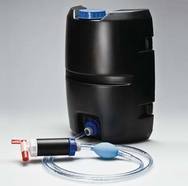
This mobile system for cheap, simple, decentralised water treatment is a response to the lack of clean drinking water in developing countries and disaster areas. It purifies contaminated water without electricity or chemistry, and consists of two units – WaterDonut and UltraPipe. These parts can work together or on their own.
The WaterDonut uses the disinfecting influence of the sun – SODIS (solar disinfection) effect. Both parts of the WaterDonut are laid out in the sun for six hours. UV radiation infiltrates the water through the transparent inner side of the donut, and along with the heat from the sun, the water is disinfected reliably. The unit is constructed to last about ten years. The UltraPipe filters water through a pressure-driven membrane. The required pressure of 0.2 bar can be produced with a manual pump or with 2 metres of vertical height. It works independently of the weather, but the membrane must be renewed at least every year.
The sickle shape of both halves of the WaterDonut prevents the water depth from exceeding 10 centimetres. (The deeper the water, the weaker the effect of the UV-radiation.) While PET bottles (which are often employed for the SODIS effect) can only be effective with volumes up to 2 litres, the WaterDonut has a capacity of 16 litres per canister. When the WaterDonut is clipped together to form a barrel, it can be moved easily by rolling – even by people of physical weakness. Rolling also increases the oxygen content of the water (as though it were being shaken).
Nearly the whole UltraPipe is composed of standard parts certified by DIN (Deutsches Institut für Normung – the German national organisation for standardisation). That enables a low price for the whole device. In addition, it can be connected to any canister with an adequate DIN-thread (for example the WaterDonut). The use of standard parts ensures the access to spare parts all over the world.

Comments by our Users
Be the first to write a comment for this item.